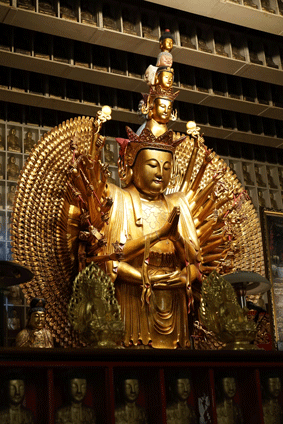The Ten Hearts of Avalokitesvara
Most of us are familiar with the “Six Syllable Mantra:” Om Mani Padme Hum, the mantra of great compassion, but some may not know of the “hearts” associated with the mantra, so here we go.!
A thousand hands and a thousand eyes nurture and watch over living beings, protecting, and guiding them, real and metaphoric symbols expressing the awesome power and efficaciousness of the actions of Avalokitesvara, the Goddess of Great Compassion, as she secures the welfare of living beings everywhere. The heart of great compassion is divided into ten.[1]
Avalokitesvara’s heart can be our heart, as well, if we endeavor to embrace her principles. If we embrace Avalokitesvara in out practice, we can be one of her hearts, assisting her in her work. Study the hearts below and choose which heart you would like to be to help Avalokitesvara perform he compassionate work.
1: The first heart is the compassionate heart. Those of us who recite the Great Compassion Mantra as a dharma door must ask ourselves whether or not we are reciting the Great Compassion Mantra with a single mind focusing on the welfare of others or reciting the mantra while thinking of our personal affairs. If we are reciting the mantra with our mouth, while our heart is on our personal affairs, how can we expect to benefit others? We cannot. But, if our heart is full of concern for living beings welfare, then even when we are not reciting we will benefit others.
- The second hear is the Equality Heart. This is being free of all clannishness and prejudice and spreading love like a rain sheds its drops, universally moistening and nurturing life below. If you can treat everyone as we would your parents, siblings, or closest friends, then you will bring great benefit to all.
3: The third heart is thee Unconditioned Heart. The Unconditioned Heart is not influenced by deviant thoughts and views. It is our pristine heart uncontaminated by selfishness. The mantra recitation of one whose mind is not mixed with selfish thoughts is a mind very capable of teaching and transforming others.
4: The forth heart is the Unattached Heart. This heart is free of scattered thoughts, particularly thoughts of sexual desire, but also thoughts greedy for material things, and delicious food. A mind free of craving will be sensitive to the needs of others and their desires.
5: The fifth heart is the Emptiness Heart: This heart regards all dharmas as empty, like an illusion. If we recognize all dharmas and rituals are provisional devices established for the purpose of leading beings from suffering, we won’t confuse the dharma we are practicing for genuine realization.. We won’t confuse reciting a mantra of compassion, with the actual feeling of compassion. True cultivators have no mind they are cultivating.
6: The Sixth heart is the Respectful Heart. We who wish to perfect this heart should respect all living beings and see them as Buddhas. We should not judge beings and compare them, liking some and not others, seeing some as deserving our respect and others not deserving it. Instead, we should equally respect all life.
7: The seventh heart is the Humble Heart. This heart is never arrogant or self-satisfied. We should never be arrogant or self-satisfied, thinking that what we have done is sufficient or our present happiness is enough. We must recognize that those with less spiritual practice than we may have qualities and insights that we have yet to realize. A humble heart will go a long way towards our realizing that we have yet much to achieve and help us to see the pointlessness on resting on our achievements.
8: Th eighth heart is the Unconfused Heart. This heart is very resolute and decisive in action. This heart never does anything with mixed intentions or unclear motivations. It is having a sense of purpose while acting without even the slightest muddledness or confusion. It is never doing things just for the sake of doing things.
9: The nineth heart is the No View and No Grasping Heart. This heart is not confused by the thought that something is known and grasping the “knowing” to the point that our knowing actually becomes an obstacle (because of our attachment to it.) Becoming attached to our knowing obscures what we know and causes us to be ineffective in our actions.
10: The tenth heart is the Unsurpassed Bodhi Heart. This heart is bent on attaining the unsurpassed, equal, and right enlightenment and directing all our efforts towards achieving that ambition. Reciting the great Compassion mantra is the means to achieve this aim.
Those who recite the Great Compassion Mantra should cultivate these ten hearts If we cultivate the hearts our mental attitude will be in tune with the mantra, and we will be in harmony with others and our environment. Successful recitation is directly linked to our all-embracing compassionate view. If we do not have the right view when we recite, a view in accord with the ten principles outlined above, our recitation will be ineffectual like the blowing of the wind.
[1] Dharani Sutra











Read 0 comments and reply